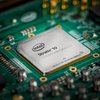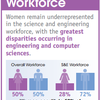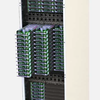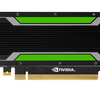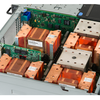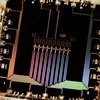Intel announced it is sampling its Stratix 10 FPGAs, the latest family of field programmable gate arrays that are designed to accelerate a number of datacenter workloads. The new devices, which Intel is calling the most significant FPGA innovations in over a decade, offer advanced features like embedded 64-bit ARM processors, second-generation High Bandwidth Memory (HBM2), and DSP blocks.
As HPC vendors like IBM and HPE have added deep learning-optimized systems to their product portfolio, Cray has been more circumspect about its plans in this area. We talked with Cray CTO Steve Scott about how they view this new application area of high performance computing and what they may have in the pipeline to serve this burgeoning market.
In a year in which a woman has a good chance of becoming the leader of the free world, talk of gender diversity has become pervasive. Even in the secluded confines of the HPC community, discussions of the underrepresentation of women in supercomputing has become a real topic, and at no time has this become more apparent than in the run-up to SC16.
At NVIDIAs first European GPU Technology Conference (GTC Europe) taking place in Amsterdam this week, CEO Jen-Hsun Huang announced a number of new users of the DGX-1 GPU-powered supercomputer in a box. Huang also teased attendees with an early look at one of their next-generation Volta GPUs designed to power self-driving cars.
Microsoft has revealed that Altera FPGAs have been installed across every Azure cloud server, creating what the company is calling the worlds first AI supercomputer. The deployment spans 15 countries and represents an aggregate performance of more than one exa-op. The announcement was made by Microsoft CEO Satya Nadella and engineer Doug Burger during the opening keynote at the Ignite Conference in Atlanta.
The path to exascale computing hasnt been an easy one. It has had to face a daunting set of challenges in energy efficiency, application parallelism, and system reliability, just to name a few. The difficulties in bringing the hardware and software up to this level is considerable, but there is a more fundamental challenge at the heart of exascale: doing the necessary work of building an ecosystem that will last for a decade or more, not just for a handful stunt machines.
Aquila, a system provider based in Albuquerque, New Mexico, has unveiled a new liquid-cooled server platform that offers one of the densest and most energy-efficient architectures in the market. The platform, known as Aquarius, uses a patented warm water cooling technology along with rack-level power distribution to minimize energy consumption and allow for very high levels of computational density.
NVIDIA has unveiled the Tesla P4 and P40, two new GPUs aimed at the very latest AI machinery. The processors are based on the companys Pascal architecture and incorporate new features aimed at deep learning inferencing work in areas likeimage and speech recognition, language translation, and recommendation engines. The announcement was made at NVIDIAs GPU Technology Conference taking place in Beijing, China this week.
IBM has unveiled what is probably the most powerful server the company has ever offered and one of the most computationally dense on the planet. The new S822LC for High Performance Computing, as it is called, is equipped with two IBM Power8 processors and four of NVIDIAs latest Tesla P100 GPUs. As such, IBM is first OEM to go to market with Pascal GPU-accelerated servers incorporating NVLink technology.
Over the years, there have been a torrent of breakthroughs in quantum computing research. But for the first time since in many years, the technology looks to be on the verge of fulfilling its promises. Thanks to an ambitious effort at Google, quantum computing may become a reality within the next two or three years. A report at the New Scientist unravels Googles plans to commercialize the technology and attain what the company is calling quantum supremacy.
